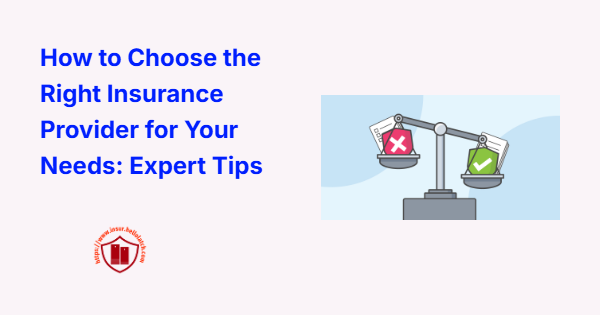
Choosing the right insurance provider is a crucial decision that can significantly affect your financial security and peace of mind. Whether you’re shopping for health, auto, home, or life insurance, selecting the best insurer for your needs requires careful thought and consideration. With a wide variety of options available, it’s easy to feel overwhelmed. To help guide you through the process, here are expert tips on how to choose the right insurance provider for your unique needs.
1. Assess Your Insurance Needs
Before you start comparing insurance providers, take a step back and assess what coverage you truly need. Insurance policies come in various types, and each serves a different purpose. For example, auto insurance covers your car, but it doesn’t protect your home or health. Similarly, life insurance provides a financial safety net for your loved ones.
To determine your needs:
- Auto Insurance: Consider your driving habits, the age of your car, and whether you need additional coverage such as collision or comprehensive.
- Home Insurance: Think about the value of your home and possessions, and if you need additional coverage for natural disasters like floods or earthquakes.
- Health Insurance: Consider your medical history, preferred healthcare providers, and whether you require specific treatments or prescriptions.
- Life Insurance: If you have dependents, consider how much financial support they would need in case of your death.
Understanding these needs will help you narrow down the types of policies you should seek and help providers offer the right options for you.
2. Research the Insurer’s Reputation
Once you’ve determined your coverage needs, the next step is to research potential insurers. Reputation is key when selecting an insurance company, as it can affect everything from the claims process to customer service. Start by reading customer reviews, asking for recommendations, and checking out third-party ratings from organizations like J.D. Power and A.M. Best, which evaluate insurance companies based on customer satisfaction and financial stability.
Key factors to consider:
- Customer Service: How easy is it to contact the company and get help? Is their support prompt and professional?
- Claims Process: How smoothly does the claims process work? Are claims typically resolved quickly and fairly?
- Financial Stability: A financially stable company is essential for ensuring your insurer can meet its obligations in case of a claim.
A reputable insurance provider will have a history of treating customers fairly and providing reliable coverage.
3. Compare Quotes and Coverage Options
One of the most important aspects of choosing the right insurance provider is comparing different quotes. While cost should not be the only factor in your decision, it’s still essential to shop around for the best value. When comparing quotes, make sure you are comparing policies with similar coverage levels and deductibles to get an accurate sense of the cost.
In addition to the price, pay attention to:
- Policy Limits: Are the coverage limits appropriate for your needs?
- Exclusions: What is not covered by the policy? Are there any gaps in coverage that could leave you vulnerable?
- Discounts: Many insurers offer discounts for bundling policies, maintaining a good driving record, or installing home security systems.
By comparing multiple options, you can find the balance between cost and coverage that fits your needs.
4. Look for Flexible and Customizable Policies
Every individual and family has unique needs, and your insurance provider should offer flexible policies that can be customized to suit your situation. For example, if you live in a high-risk area for natural disasters, you may need additional coverage for floods or earthquakes. Similarly, if you have specific health concerns, you’ll want a health plan that offers coverage for specialists, prescriptions, or specific treatments.
A good insurer should allow you to tailor your coverage to fit your unique circumstances. Look for providers who offer customizable policies and are willing to work with you to adjust your coverage as your needs change over time.
5. Evaluate the Financial Impact of Your Deductibles and Premiums
While it’s tempting to choose the lowest premium to save money, it’s important to consider the long-term financial impact of both premiums and deductibles. A policy with a lower premium often comes with a higher deductible, which means you’ll pay more out-of-pocket if you need to make a claim. Conversely, a policy with a higher premium may offer lower deductibles and better overall coverage.
Carefully evaluate how much you’re willing and able to pay out-of-pocket in the event of a claim and choose a policy that strikes the right balance between affordable premiums and manageable deductibles.
6. Customer Support and Accessibility
You’ll need a reliable and accessible insurance provider in case you ever need to file a claim or make changes to your policy. Customer support should be readily available, and the company should offer multiple ways for you to contact them, whether via phone, email, or live chat. Check if they have a user-friendly mobile app for easy access to policy details, claims tracking, and customer service.
Conclusion
Choosing the right insurance provider is an essential step in protecting your health, home, car, and financial future. By assessing your needs, researching insurers, comparing quotes, and evaluating customer service, you can find a provider that offers the best value and coverage for your situation. Insurance may feel overwhelming at times, but with these expert tips, you can make an informed decision that gives you peace of mind and protects your assets in 2025 and beyond.

Hi
မိုက်နေပီ